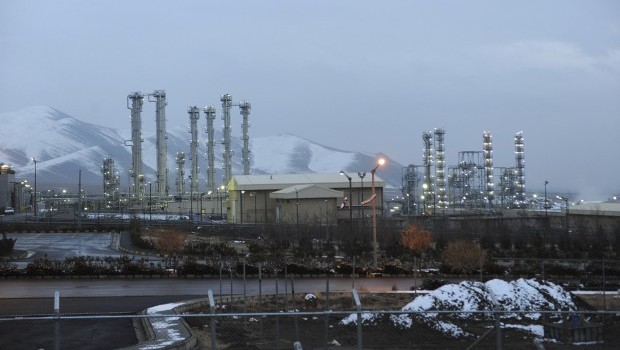In a controversial interview, Hossein Mousavian, former Iranian nuclear negotiator, spoke of the international community’s decade-long struggle to come to terms with Iranian nuclear weapons. However after ten years of proposals from the P5+1 group that have aimed to limit Iran’s uranium enrichment efforts in exchange for recognition of Tehran’s right to a peaceful nuclear program and the lifting of sanctions, such offers are no longer the centerpiece of talks.
Mousavian worked previously as the Iranian ambassador to Germany and later as the spokesman for former nuclear negotiator Hassan Rowhani, but during the reign of President Ahmadinejad he was arrested and accused of spying for the West. Since 2009 he has lived in the United States while working as a researcher at Princeton University while he continues to be a vocal advocate for finding a mutually beneficial resolution to the impasse.
His reading of the crisis is trite and predictable; everyone knows that the Iranian regime is in a race against time to obtain nuclear weapons, and thus create a new geopolitical reality that would render the negotiations meaningless. Wallowing under economic sanctions and dreading the geopolitical repercussions of fallout in Syria, Tehran is eager to complete enrichment and thus bring an end to this precarious phase.
With Iran conceding nothing new in terms of transparency or complying with regulations, Mousavian is advising the West to embrace Iranian Supreme Leader Ayatollah Khamenei’s recent fatwa which deemed weapons of mass destruction to be haram (religiously forbidden) and sinful. This fatwa could potentially serve as a face-saving measure in the event that the intractable crisis is defused, because it can later be adopted as a law by the Iranian parliament and presented to the West and the international community as a guarantee of nonproliferation.
Most fatwas use religion to deceive the people or provide quick fixes with soaring rhetoric, but this particular fatwa borders on the farcical in that it is attempting to elevate ideological edicts to the international arena. If Mousavian were a correspondent embedded deep in Iran, the news would be written off as a mere joke, but he is a respected mediator and credible observer who defected from the regime in Tehran. Herein lies the problem, Iran is approaching the United States and the rest of the international community under the assumption that they are subject to the supreme leader of Iran’s authority.
Obama’s fragile and confused foreign policy has given these discordant voices undue prevalence, not only in regards to the Iranian crisis, but also regarding the Arab Spring whose hopes for democracy were dashed by the ascendancy of political Islam. Earlier this week Obama urged Iran to take “immediate and concrete” action to ease tensions caused by its nuclear program. He added: “Since taking office [in the beginning of 2009], I have offered the Iranian government an opportunity—if it meets its international obligations, then there could be a new relationship between our two countries, and Iran could begin to return to its rightful place among the community of nations . . .I have had no illusions about the difficulty of overcoming decades of mistrust.”
Of course this Obamanian flirtation with Iran elicits feelings of uncertainty for the countries in the vicinity of the Islamic Republic. This is especially true for the Gulf states which not only fear the threat of a nuclear Iran, but also look warily at its designs to become a regional hegemon, evidenced by the atypical alliances, which border on “co-opting”, that Tehran has established with various African countries suffering from neglect and economic crises. They also point to the coalition of forces with which Iran plans to encircle the Gulf and expand its political influence as evidence of Iran’s designs on the region.
The people of the Gulf, still fascinated with the events of the Arab Spring, do not share their governments’ concern. Like most cases of collective consciousness, they do not care much for detail and find it easy to overlook the negative consequences of the Arab Spring.
Waning American influence in the region has created vast power vacuums which all regional actors, especially Iran and Turkey, are seeking to fill. Iraq, Syria, Beirut, and Gaza, in addition to the countries of the Arab Spring, all fall within the range of influence of at least one of the two ascending regional powerhouses. Meanwhile the Gulf states are refraining from taking meaningful actions, which prevents them from becoming a major regional player given their formidable economic weapons, preferring instead to operate in a strictly reactionary manner as Iran and Turkey attract new allies. We all remember the declaration written by 17 Iranian intellectuals appealing to President Mursi to model Egypt’s political system after Iran’s in hopes of creating a political common ground on which a future Brotherhood-Tehran coalition may be based. The Gulf states are wary of the Brotherhood’s ruling structure, but at the same time, they fear political fallout could plunge the region into chaos and civil war.
Should we be worried by Obama’s new rhetoric? Yes, of course. Any attempt to create new alliances with Iran or Turkey or even countries of the Arab Spring at the expense of the Gulf states means that we are outside the region’s geopolitical calculations, at least until the 2016 elections.
For me the best bet is on building awareness in Gulf societies, starting with the elite, regarding the seriousness of the current stage in which we find ourselves, while avoiding catchy slogans and narrow agendas. Building awareness of the fact that we are being targeted requires that progress be made through sustainable development, fighting corruption, undertaking economic projects, establishing internet compatible governance, and lastly, solving the problems of unemployment, resettlement, and all those other issues that will benefit the people and keep them in the country.
